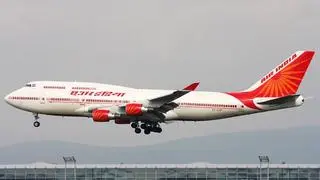Wouldn’t it be nice if your aircraft indicated the space available in its overhead bins to help place your hand luggage faster and without hassle? What if you could book such space in advance?
These and more such features of convenience are not too far away, going by the growing role of technology in travel. Some of these tools for enhanced passenger experience were on display at the Airbus Innovation Days 2019 in Toulouse to a visiting team of media professionals from across the globe.
Central to Airbus’ demonstration of the connectivity of various cabin elements, including the ‘connected bin’, is its digital offering, Skywise, which is driven by the power of data.
Airbus launched Skywise — an open, integrated, cloud-based data platform for the aviation industry — in 2017. The platform, set up in collaboration with big data specialist Palantir Technologies, has seen good traction over the past two years. From four early adopters, the number of airlines on Skywise increased to about 20 by March 2018 and has now crossed the 80 mark with participation from across the globe.
The list includes GoAir, the platform’s first Indian customer, which signed up in February this year. More than 6,500 aircraft, 10,000 monthly users and 15 suppliers are now on the platform. Airbus hopes to have 100 airlines on board by end 2019.
It’s not just Airbus aircraft that Skywise caters to. The company says that about 40 per cent of the 6,500 aircraft connected to the platform are non-Airbus aircraft, and that airlines with mixed fleet are already on the platform.
Airbus is engaging with players across the aviation ecosystem, including technology providers and lessors, to join the Skywise platform. A few weeks back, it opened Skywise to global IT service providers and five leading players have joined the early adopter programme. Getting airports on board is among the next steps of extending the Skywise ecosystem.
Data, the building block
With the digital revolution encompassing aviation too, there is a massive amount of data being generated in the industry. For instance, the Airbus 350 aircraft has over 2,50,000 sensors on board that generate over 10 gigabytes of data every flight hour. Besides, the industry sees millions of maintenance actions undertaken every year. The quantum growth of data in the industry is also being catalysed by new technologies such as artificial intelligence and new business models such as asset sharing.
But like many other industries, aviation too suffers from the data silo effect. Different stakeholders — such as aircraft manufacturers, airlines, airports, suppliers, lessors and MRO (maintenance, repair and overhaul) players — have only a part of the data. In itself, each piece of this data is important. But it can have a multiplier effect when all the data and information is put together on a platform and made available for analysis and use to all stakeholders.
That’s what Skywise intends to do, claims Airbus. Marc Fontaine, Digital Transformation Officer, Airbus, says, “Skywise is creating a truly open, secure and collaboration-based environment for the aviation industry to speed up its digital transformation. The aim is to make the data sharable, open and transparent to create value for the whole aviation ecosystem, recreating digital continuity.”
But how is Skywise different from other platforms in the aviation industry that offer predictive analysis and other technology-based solutions? Airbus says that Skywise is much larger in scope with predictive maintenance being just one application among many others. The sharing of data across the aviation industry makes Skywise-based applications much more powerful, claims the company.
Benefits for players
At its core, various aviation industry players pool their in-service data into the Skywise platform, which then serves as a data repository.
To address privacy and competitive concerns, data anonymity is maintained and Skywise provides players secure access to their aggregated and anonymised data, complemented by data from multiple sources across the industry. This comes at no cost to the players. Airbus says that Skywise helps players improve their operational performance and business results.
For instance, according to Airbus, Skywise helped improve Bangkok Airways’ on-time performance from 53 per cent in 2017 to 93 per cent in 2018. Also, the platform reduced LATAM’s mechanical issues leading to delays — from 24 per cent to 15 per cent — by identifying repeated problems, anticipating occurrences and taking preventative action, says Airbus. Closer home, GoAir plans to use Skywise to reduce its operational interruptions and maximise its aircraft utilisation and flight operations.
Skywise could help airports provide services for optimised air and ground traffic management, says Airbus.
How does Airbus benefit from Skywise? The company says that the operating data about Airbus aircraft that airlines share on the platform helps it deliver more efficient support and aircraft improvements. Also, Skywise has the potential to become a marketplace for innovation in the aerospace industry.
For passengers, all this could mean an improved travelling experience — for instance, placing your luggage in the overhead bin with minimum fuss and maximum efficiency.
The writer was in Toulouse to attend the Airbus Innovation Days 2019 at the invitation of Airbus








Comments
Comments have to be in English, and in full sentences. They cannot be abusive or personal. Please abide by our community guidelines for posting your comments.
We have migrated to a new commenting platform. If you are already a registered user of TheHindu Businessline and logged in, you may continue to engage with our articles. If you do not have an account please register and login to post comments. Users can access their older comments by logging into their accounts on Vuukle.